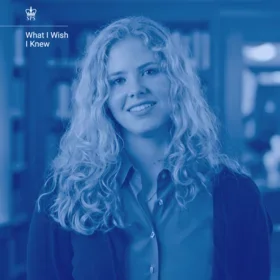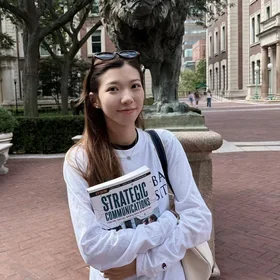Teresa Chan, director of the Columbia master’s in Insurance Management program, checked in with current student Marissa Peters about her experience in the program after the first two months of study.
Marissa is an assistant vice president of Process Excellence at USAA P&C with extensive experience in operations and process management, including risk management. She has already earned a master’s in Organizational Leadership and wanted to enroll in the Insurance Management program for a holistic understanding of the business to complement her expertise.
Here’s why Marissa chose this program, how she is balancing work and family and academics, and the value of her newfound knowledge to her job.
Choosing the Columbia Insurance Management Program
Chan: Why did you enroll in this master’s program?
Peters: So here’s my major reason. I sit in a central spot within our [company]. I have a very large role, but I’m not in the product or one of the operational spaces like claims or distribution or pricing. But because of my role, having a level of understanding of what’s happening in those spaces would make me the most effective.
One of my development plans has always been to increase my industry knowledge. But how do we do this at speed? I had that industry knowledge that at the appropriate level makes you a little dangerous. I actually took this [curriculum], sat down with both my boss and our general manager of the property product line, and said, “Okay, here’s what it does. Do you think this is at the right level?” They said: “That’s the entire value chain. Let’s go for it.”
Work-Life-Academic Balance
Chan: You’re very involved in volunteering in addition to balancing work and family obligations. So what’s it like to go back to school while working? The lectures are asynchronous, but everything else is pretty involved, especially in terms of group work.
Peters: I actually didn’t change a whole lot about my scheduling routine when I first started, and then I progressively realized, okay, this is more than I thought; I thought I would be able to dedicate the weekend, and I was unsure—maybe I signed up for too much, maybe [I] didn’t realize the rigor that this is [going to] to involve. But you see a pattern of how and when things are delivered, and when you work with groups, what that looks like. You have to really create that prioritization routine for yourself. And so it was really about training myself again.
Chan: You work full-time, you have a young family, and you actively volunteer for the Insurance Supper Club. So you are somebody who can do it all. It just takes some time to get into a rhythm.
Peters: The other thing that I have realized: When my daughter was in volleyball season, every single professor understood that there’s work, and there's your life. They are so good about accommodating, and their responsiveness to email has been fantastic. I was shocked.
One of my development plans has always been to increase my industry knowledge. But how do we do this at speed?"
Value of Course Content at Work
Chan: You mentioned that you applied something from the first week of the Claims Management course. Can you give us examples of how the program has lived up to the motto “Learn today, apply at work tomorrow”?
Peters: I have so many examples. I’m in a unique spot. I do a lot of work with our product-development teams, but I’m always on the back end. “You know what your product is? Let’s set up the processes. Do you guys have the right controls in place, KPIs?” And most times they tell me what they’re going to do.
Recently with both Nick Weltmann’s Product Pricing and Distribution and Bob Percopo’s Role of Finance in Insurance courses, I was really nervous because it’s not my space, and we had to come up with new product ideas. Both of them came back with just extraordinary comments about how well my product was written and expressed that there is really potential to take it further. Last week I sat in one of their [product development] planning sessions as their process partner, and I was able to contribute to the entire process. I was able to jump in on all of those conversations that actually helped my team. And it just blew my mind that I was able to do that. It blows their mind away.
We also just went through our annual planning cycle. Every time my colleagues start talking about growth, or what we look like in terms of product growth, what our PTIs are, and efficiency—there’s a zone-out, because it’s not my space. This time, when I was sitting in our forecast planning sessions, I understood everything that they were talking about and then was able to actually bring up challenging issues like “But if we don’t actually hit this by the end of the year, we’ve already blown our [forecast] by the time we get to [2023]. Our forecast is completely off.”
When our President came around asking everyone, “Are you good with this?” I was able to say, “I’m good with it, with the exception that we have to understand X, Y, and Z.” I’ve never done that before. So wow! Two great wins within two months.
The Online Asynchronous Learning Experience
Chan: How has the balance of asynchronous and synchronous been working in terms of the learning experience? Do you feel that you are working on an island?
Peters: Not at all, not at all. I make great connections, and we even ask each other, “Am I the only one not understanding this?” or “What does this look like?” or “Who’s done this already?” I think that works really well; the groups are great. I think we secretly love when we have to all get on a call together and we end up just talking before you actually get to the assignment.
We’re all going through the same thing—the more open we are about it, the more we can rely on each other. You know, it does get easier.
The Columbia University Master of Professional Studies in Insurance Management equips a new generation of professionals to lead insurance businesses with advanced industry knowledge, strategic and operational expertise, and the skills to champion new ideas.
Fall 2023 application deadlines for the M.P.S. in Insurance Management program are March 15 for applicants with international documents and June 15 for the final deadline. Learn more here.


